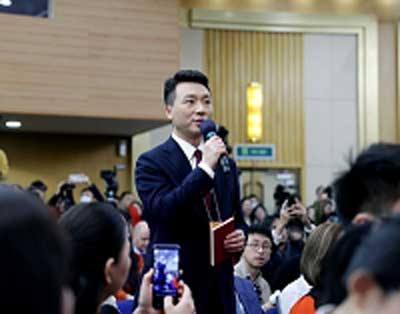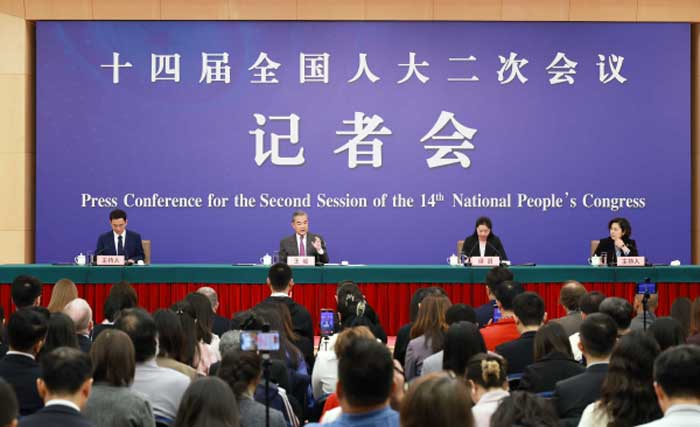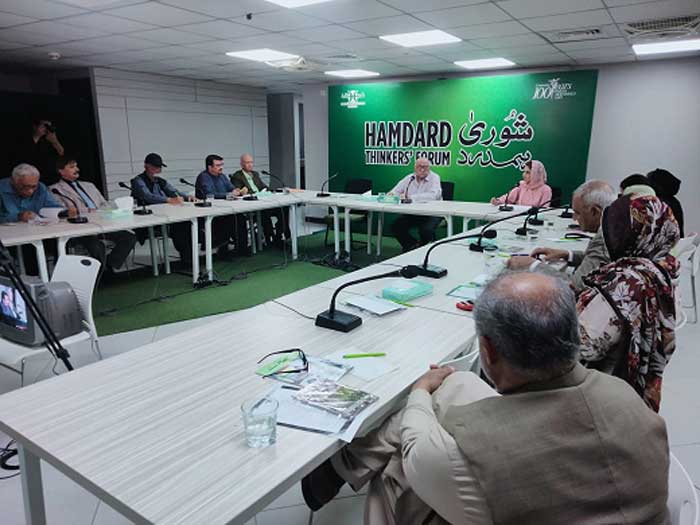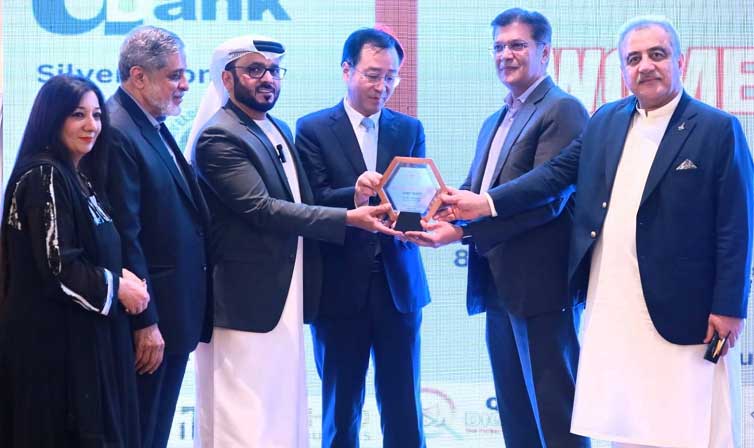A press conference was held on the margins of the Second Session of the 14th National People’s Congress at the Media Center, during which Member of the Political Bureau of the CPC Central Committee and Foreign Minister Wang Yi answered questions from Chinese and foreign media about China’s foreign policy and external relations.
Wang Yi: Friends from the media, good morning. I am very pleased to meet you again during the NPC and CPPCC sessions. The world landscape today is undergoing profound transformation, and human society is confronted with multiple challenges. In this changing and turbulent international environment, China will remain a staunch force for peace, stability and progress of the world. In his report to the 20th National Congress of the Communist Party of China (CPC), General Secretary Xi Jinping pointed out that although this is an era fraught with challenges, it is also an era brimming with hope. China will stand firmly on the right side of history and on the side of human progress, and will advocate vigorously peace, development, cooperation and mutual benefit. It will pursue its development along with its efforts for peace and development of the world, and at the same time, it will make greater contributions to world peace and development through its own development. It was also stressed in the report that the CPC is dedicated both to pursuing happiness for the Chinese people and rejuvenation for the Chinese nation and to promoting human progress and world harmony. That is our mission and our duty. It is also our aspiration and our goal. With that, I’m ready to take your questions.
China Central Television: Could you talk us through China’s most impressive diplomatic achievements in the past year? At the Central Conference on Work Relating to Foreign Affairs, it was pointed out that major-country diplomacy with Chinese characteristics would enter a new stage where much more could be accomplished. Could you share with us in what areas of its diplomacy China will seek to accomplish more?

Wang Yi: The year 2023 not only witnessed pioneering efforts but also great harvests in China’s diplomacy. Under the strong leadership of the CPC Central Committee with Comrade Xi Jinping at its core, the Chinese foreign service fully implemented the guiding principles set forth at the 20th CPC National Congress. We took steps to promote international solidarity and cooperation, and offered solutions to crises and challenges. We contributed to world peace and development, and broke new ground in China’s diplomatic theory and practice.
In the past year, President Xi Jinping hosted two major diplomatic events in China, attended three multilateral summits, made four important overseas visits, and had more than 100 meetings and phone calls. Head-of-state diplomacy is getting increasingly irreplaceable in providing strategic guidance. The Central Asian region and the Indochina Peninsula all embraced the vision of a community with a shared future for mankind, and new progress was made in the joint efforts by China and African, ASEAN, Arab, and Latin American and Caribbean countries to realize the same vision. The Third Belt and Road Forum for International Cooperation was a success, taking Belt and Road cooperation to a new stage of high-quality development. BRICS achieved a historic expansion, opening a new chapter of united strength for the Global South. We facilitated the historic reconciliation between Saudi Arabia and Iran, and mediated a ceasefire agreement in northern Myanmar. We promoted political settlement of all hotspots and conflicts. We resolutely opposed all hegemonic and bullying acts, and effectively safeguarded China’s sovereignty, security and development interests as well as the common interests of developing countries. We conducted diplomacy to serve the Chinese people and to fully support the development and stability of the country.
At the Central Conference on Work Relating to Foreign Affairs at the end of last year, President Xi Jinping outlined a comprehensive plan for China’s external work for the present and beyond, which was a top-level design for China’s diplomatic strategy on the new journey. We will study and implement the guiding principles of the Conference in real earnest. We will follow the guidance of Xi Jinping Thought on Diplomacy, focus on building a community with a shared future for mankind, and act with a stronger sense of historical responsibility and a more vibrant spirit of innovation to accomplish more in our major-country diplomacy with Chinese characteristics.
We will be more confident and self-reliant in cultivating the features of China’s diplomacy. Our national development and rejuvenation will always be based on our own efforts, and the future of the Chinese people will always be in our own hands. We will remain firm in pursuing the independent foreign policy of peace, and resolutely safeguard China’s sovereignty and national dignity.
We will be more open and inclusive and conduct diplomacy with a broad vision. We will consolidate and expand our global network of partnerships, promote a new type of international relations, and promote mutual respect and mutual learning between civilizations. We will strive for stability in major-country relations, common progress with our neighbors, and rejuvenation with fellow countries in the Global South.
We will uphold fairness and justice, and further establish the ethos of China’s diplomacy. We will practice true multilateralism, and promote greater democracy in international relations. We will be more unequivocal on issues of principle concerning the legitimate rights and interests of developing countries and the future of humanity, and will shoulder greater moral responsibility and press ahead in the right direction of history.
We will promote win-win cooperation, and stay true to the ideal of China’s diplomacy. We will stay on the right path of seeking solidarity and cooperation, offer more solutions with Chinese wisdom to regional hotspots and global issues, and provide more public goods in the interest of world peace and development. China’s new development will bring about new opportunities to the world.
Rossiya Segodnya: This year marks the 75th anniversary of diplomatic ties between Russia and China. The bilateral relationship has grown to an unprecedented level in recent years. Given the ongoing global transition in international relations, what is the most effective way to tap the potential of Russia-China cooperation?
Wang Yi: Under the strategic guidance of President Xi Jinping and President Vladimir Putin, the China-Russia comprehensive strategic partnership of coordination for the new era has been moving forward on a high level. Political mutual trust is deepening. Cooperation remains mutually beneficial and complementary to each other. The two peoples are enthusiastic about mutual exchanges. Last year, bilateral trade reached a record US$240 billion, hitting the target of US$200 billion ahead of schedule. Russian natural gas is fueling numerous Chinese households, and Chinese-made automobiles are running on Russian roads. All this shows the strong resilience and broad prospects of China-Russia mutually beneficial cooperation.
Maintaining and growing the China-Russia relationship is a strategic choice by the two sides based on the fundamental interests of the two peoples. It is also what we must do to keep pace with the trend of the world. As key major countries of the world and permanent members of the U.N. Security Council, China and Russia have forged a new paradigm of major-country relations that differs entirely from the obsolete Cold War approach. On the basis of non-alliance, non-confrontation and not targeting any third party, China and Russia strive for lasting good-neighborliness and friendship and seek to deepen their comprehensive strategic coordination. In today’s world, hegemonism finds no support, and division leads nowhere. Major countries should not seek confrontation, and the Cold War should not be allowed to come back. The China-Russia relationship moves ahead along the trend of the times toward multipolarity and greater democracy in international relations, and is thus very important for maintaining global strategic stability, enabling positive interactions among major countries, and promoting cooperation among emerging major countries.
This year marks the 75th anniversary of China-Russia diplomatic relations. The two sides will also jointly launch the China-Russia Years of Culture. The relationship faces new opportunities. China is ready to work with Russia to foster new driving forces for cooperation and steadily enhance the foundation of friendship between the two peoples. With Russia chairing the BRICS mechanism this year and China taking over the chairship of the Shanghai Cooperation Organization (SCO) in the second half of the year, the two sides will strengthen international and multilateral coordination, practice true multilateralism, uphold the U.N.-centered international system, and safeguard regional and global security and stability.
People’s Daily: At the Central Conference on Work Relating to Foreign Affairs, it was pointed out that building a community with a shared future for mankind is China’s lofty goal in conducting major-country diplomacy with Chinese characteristics for the new era. In recent years, China has announced it would strive for that goal together with quite a number of countries. How do you see the prospect of building a community with a shared future for mankind?
Wang Yi: Building a community with a shared future for mankind is the core tenet of Xi Jinping Thought on Diplomacy. It is China’s solution to the question of what kind of world to build and how to build it.
President Xi Jinping has stressed many times that humanity live in the same global village and travel in the same boat. Facing various global challenges coming our way, countries should rise above their differences in history, culture, geography and system, and work together to protect the Earth, the only inhabitable planet for us all, and make it a better place. This important tenet demonstrates President Xi Jinping’s broad historical vision and deep passion for the world as the leader of a major country. It goes beyond the obsolete zero-sum game mentality, assumes the moral high ground of civilization, and captures the shared aspirations of all nations. It points the right direction for humanity at a historical inflection point where accelerated transformation unseen in a century is unfolding across the world. Building a community with a shared future for mankind has become a glorious banner leading the progress of the times. It is also the lofty goal of our major-country diplomacy with Chinese characteristics for the new era.
It’s been 10 fruitful years for this vision since President Xi Jinping put it forward. It has developed from a conceptual proposition to a scientific system, from a Chinese initiative to an international consensus, and from a promising vision to practical outcomes, showing strong vitality. From bilateral partners to multilateral institutions, from regional frameworks to global initiatives, and from public health to cyberspace and oceans, China has been building communities with a shared future with scores of countries and regions in multiple forms and domains. Time and again, the vision has been written into U.N. General Assembly resolutions as well as resolutions and declarations of the SCO, BRICS and other multilateral mechanisms.
The evolution of the international situation in recent years shows again and again that the number-one reality in today’s world is that all countries rise and fall together, and that the sure path to meeting the challenges is mutual assistance and win-win cooperation. More and more countries and peoples have come to realize that the future of humanity should be decided by all countries together, and that the future of the world should be built by all peoples together. China is ready to work with all countries to build an open, inclusive, clean and beautiful world of lasting peace, universal security and shared prosperity. The road ahead may be tortuous, but the future is bright.
Bloomberg: After last year’s meeting in San Francisco, China and the U.S. agreed to jointly manage differences and promote mutually beneficial cooperation. Since then, the U.S. has continued to increase its trade and technological restrictions on China. How does China think this trend will change? How does China plan to respond?
Wang Yi: The China-U.S. relationship is critical to the well-being of the two peoples, and to the future of humanity and the world. No matter how the international landscape evolves, China always keeps its U.S. policy stable and consistent, and always handles the relationship with a sense of responsibility for history, for the people and for the world.
Our position is the three principles proposed by President Xi Jinping—mutual respect, peaceful coexistence, and win-win cooperation. They are a statement of the experiences and lessons of the 50-plus years of China-U.S. relations, and represent the right way for interactions between major countries. They should be observed and acted upon by both sides.
Specifically, mutual respect is the precondition, because interaction sustains only when differences in social and political systems are respected and acknowledged. Peaceful coexistence is the baseline, because conflict and confrontation between two major countries like China and the U.S. have unimaginable consequences. Win-win cooperation is the goal, because when working together, China and the U.S. can do great things conducive to the two countries and the world.
At the historic meeting in San Francisco last November, the two presidents reached common understandings and charted the course for stabilizing the China-U.S. relationship and bringing it back on the track of sound development. President Xi Jinping elaborated on China’s fundamental approach and principled position on developing relations with the United States. President Biden reiterated that the U.S. does not seek a new Cold War, does not seek to change China’s system, does not seek to revitalize its alliance against China, and does not support “Taiwan independence.” He also stated that the U.S. is glad to see prosperity in China, and does not seek to contain or suppress China’s development or to decouple with China.
There has been some improvement in China-U.S. relations since the summit in San Francisco. This meets the interests and wishes of people of both countries and the world. But it has to be pointed out that U.S. misperception toward China continues and U.S. promises are not truly fulfilled. The U.S. has been devising various tactics to suppress China and kept lengthening its unilateral sanctions list, reaching bewildering levels of unfathomable absurdity. If the U.S. says one thing and does another, where is its credibility as a major country? If it gets jittery whenever it hears the word “China,” where is its confidence as a major country? If it only wants itself to prosper but denies other countries’ legitimate development, where is international fairness? If it persistently monopolizes the high end of the value chain and keeps China at the low end, where is fairness in competition? The challenge for the U.S. comes from itself, not from China. If the U.S. is obsessed with suppressing China, it will eventually harm itself. We urge the U.S. to be clear-eyed about the trend of the times, view China’s development objectively and rationally, engage in exchanges with China proactively and pragmatically, and act to fulfill its commitments. We hope that it will work with China to bring the relationship back on the track of stable, sound and sustainable development.
This year marks the 45th anniversary of China-U.S. diplomatic relations. President Xi Jinping pointed out that the hope of the China-U.S. relationship lies in the people, its foundation is in grassroots connections, its future depends on the youth, and its vitality comes from subnational exchanges. China is always ready to strengthen dialogue and exchanges with the U.S. and promote friendly exchanges in various sectors, so as to build more bridges for mutual understanding and remove unnecessary misunderstanding and biases. We believe that the two sides are fully able to find a right path for the two different major countries to get along with each other.
Xinhua News Agency: Many leaders around the world believe that the current international order fails to reflect and adapt to the shifting power dynamics of the world. China’s proposal to build “an equal and orderly multipolar world and a universally beneficial and inclusive economic globalization” has drawn wide attention and support from the international community. Could you further elaborate on this?
Wang Yi: Multipolarity and economic globalization are the prevailing trends in the advancement of human society. But there are different views on what they should look like. China believes in an equal and orderly multipolar world and a universally beneficial and inclusive economic globalization.
An equal multipolar world means equal rights, equal opportunities, and equal rules for every nation. Certain or a few powers should not monopolize international affairs. Countries should not be categorized according to their strength. Those with the bigger fist should not have the final say. And it is definitely unacceptable that certain countries must be at the table while some others can only be on the menu. We must ensure that all countries, regardless of their size and strength, are able to take part in decision-making, enjoy their rights, and play their role as equals in the process toward a multipolar world.
An orderly multipolar world means all should observe the purposes and principles of the U.N. Charter, and uphold the universally recognized basic norms governing international relations. Multipolarity doesn’t mean multiple blocs, or fragmentation, or disarray. All countries must act within the U.N.-centered international system, and pursue cooperation under global governance.
Universally beneficial globalization means growing the economic pie and sharing it more fairly. All nations, all social groups, and all communities should be able to take part in economic and social development and share the benefits. Development imbalance, be it national or international, should be settled properly so as to realize common prosperity and development.
Inclusive globalization means supporting countries in pursuing a development path suited to their own national conditions. No one should impose one single development model onto the whole world. Unilateralism and protectionism for selfish gains at the expense of others must be discarded to keep the global industrial and supply chains stable and unimpeded, and to sustain the robust and dynamic growth of the world economy.
China is ready to work with all countries to steer multipolarity and economic globalization toward the right direction as expected by the whole world, and to make global governance more just and equitable.
To be continued




